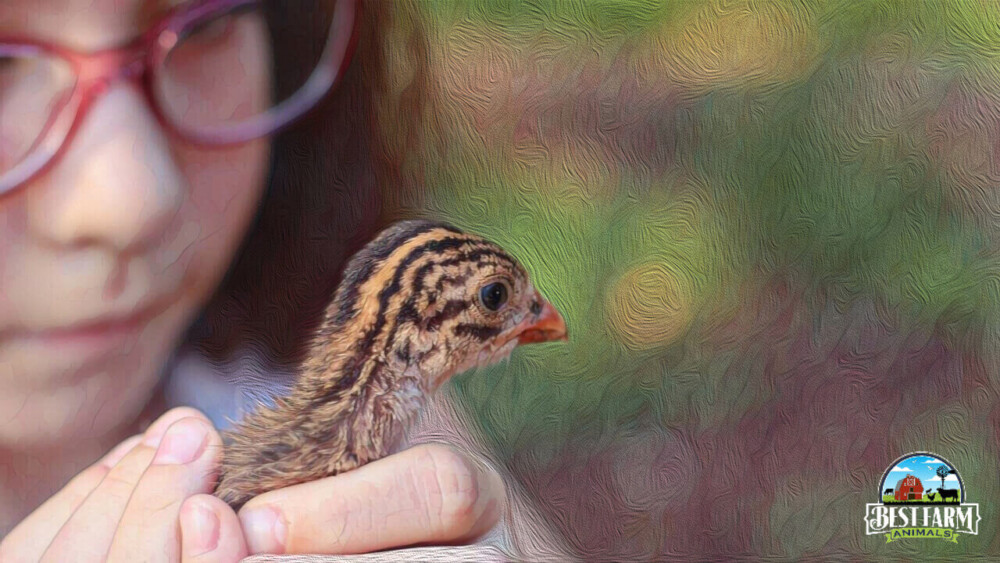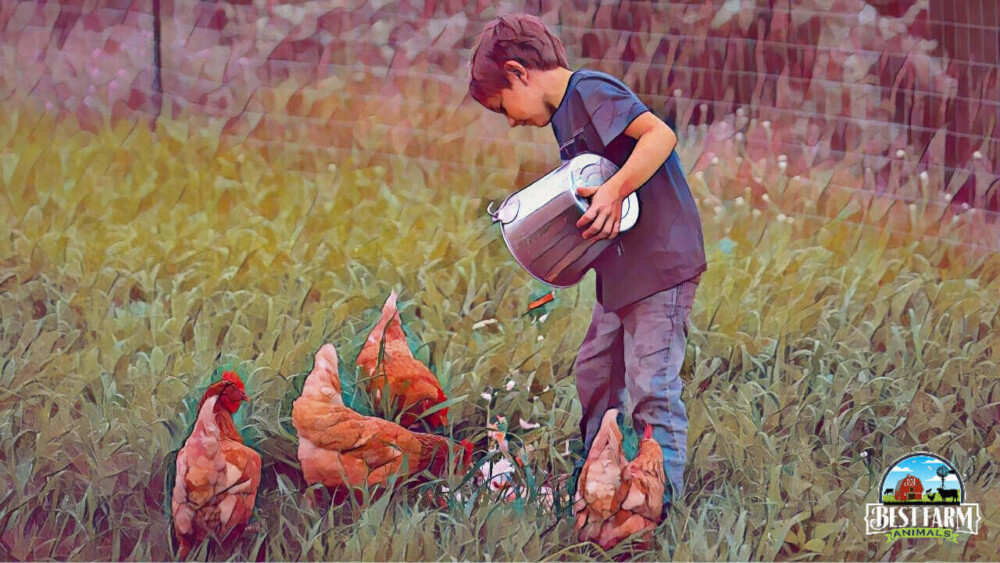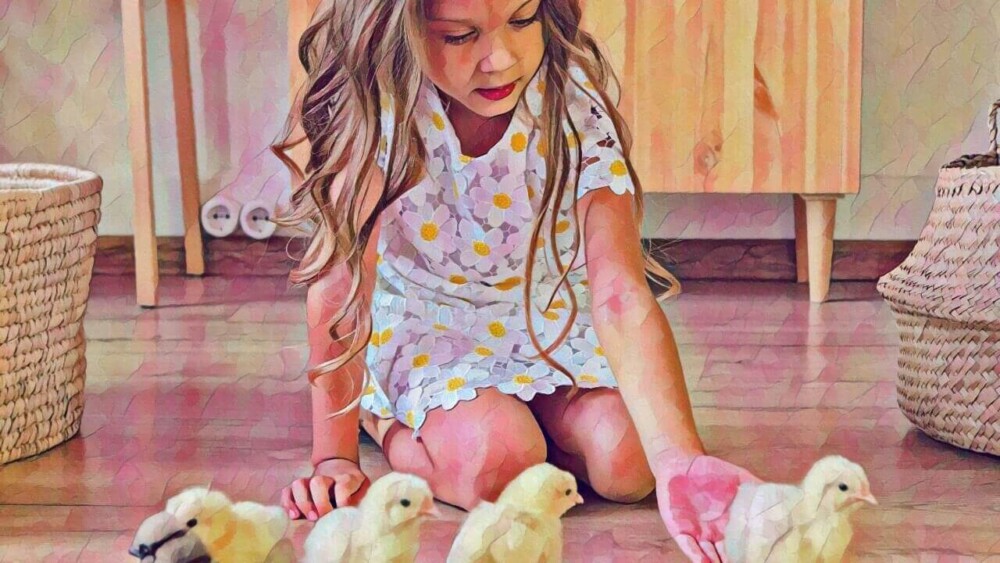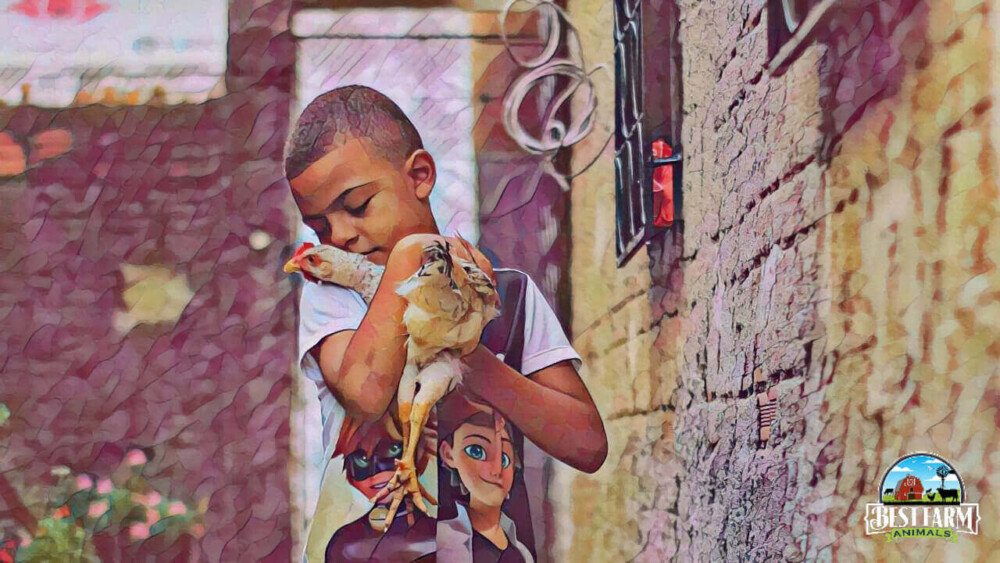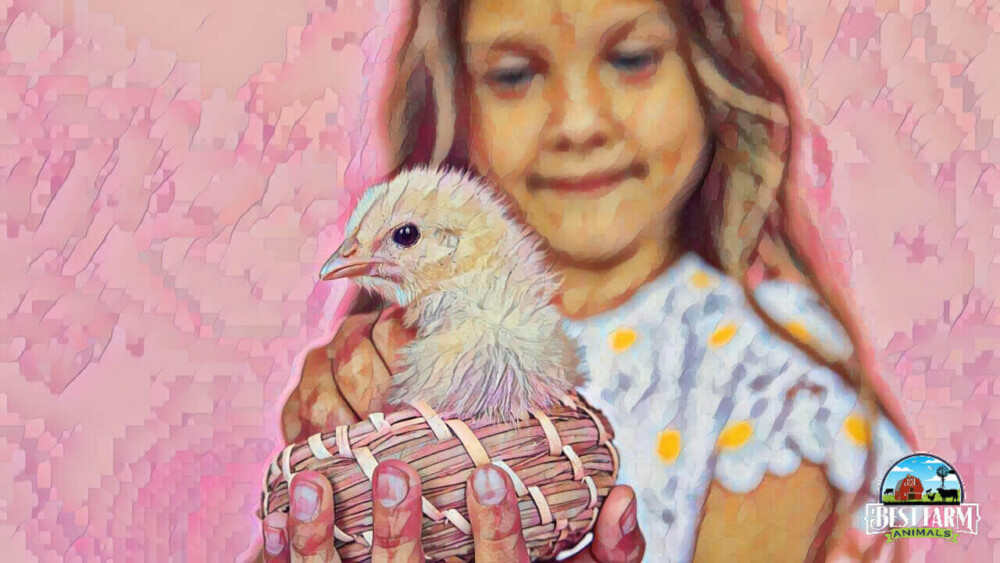When I wanted to teach my kids responsibility, give them a pet, and have farm benefits, the first animal we gave them was chickens. Chickens are arguably one of the very best pets for kids to have as a pet because they are so versatile. Chickens can bond with kids or remain as independent farm animals.
Chickens are very good for kids. Children with pets are more likely to live longer and have happier lives. Those benefits aren’t restricted to just dogs or cats.
One of the reasons I chose chickens as my kid’s first pet was because I had young children, and I wanted an animal that wouldn’t take a ton of my time caring for it. Chickens work well because young children can be taught to gather eggs, feed and water chickens, and gently hold chicks. Older kids can create an egg business, learn accounting and marketing skills, learn about breeding, showmanship, and a host of other skills.
1. Chickens Teach Kids Responsibility
Teaching kids responsibility is easiest when you start little. Chickens are ideal for kids of all ages because they can be pet quality and give loves and snuggles, or they can be friendly and independent. A friendly flock is ideal for young kids who can be taught to check the chicken’s water and feed them daily.
Kids as young as three years old can learn to carefully gather eggs, scatter scratch, or feed chickens by hand. Young children can learn to carefully hold chickens, although you’ll have some disasters.
Older children, ages 6-9, can be responsible for calling the flock in at night and locking them up. They can learn to check for injuries. At eight, kids can participate in 4H and learn how to show chickens, present themselves in front of a judge and audience, and communicate more effectively.
Tweens and Teens can create an egg business. My daughter founded her egg business at nine and learned about simple accounting, expenses, and decision-making. She learned simple accounting by creating fliers and a poster to advertise her business. She learned how to communicate with adults about her business.
2. Youth Learn Delayed Gratification From Chickens
I often hear others complain about entitled youth. Caring for chickens teaches kids to care for another living creatures besides themselves. Chickens must be fed during the cold of winter. They need water on a hot day, or they’ll die. Children learn to care for their flock even when it’s cold, raining, snowing, or hot outside. They learn to put aside their own desires for the good of another creature.
My kids have learned to wait to eat dinner until the birds are locked up. I’ve seen them battle fear of the dark (at 7pm) in the winter to lock up the birds. They’ve gotten up earlier to let them out or gone outside on a cold winter morning to open the coop door and gather eggs.
In this world of instant demand, learning to wait until others are cared for builds character.
3. Chickens are Educational
Chickens can help to teach kids many things. They can learn how to count eggs and count chickens at night when they lock them up. Eggs and chickens come in many colors and hues that help kids learn colors and sorting.
They learn about different breeds if you have a mixed flock. Older children learn about caring for injuries, watching for potential problems, and problem-solving. They can learn about entrepreneruship and business.
When kids are in charge of the flock, they learn about injuries and how to help hens heal. My kids have learned research skills as they look up what’s causing an issue or how to help protect against predators.
I’ve found that giving my kids the answer isn’t as effective as encouraging them to come up with their own solutions. Sometimes their solutions fail, but they learn from it. When I give them the answer, they question it or don’t remember it later. When they take the time to research it themselves, they learn and remember.
4. Kids Learn to Safely Handle Smaller Creatures From Chicks
Young children aren’t naturally gentle. They hold onto things tightly and haven’t developed the motor skills to hold gently. Chicks can help kids develop finer motor skills and learn to be careful when holding them.
My youngsters have occasionally dropped a chick or squeezed it too hard. But, those sad losses of a chick have taught them the importance of being gentle, which is helpful in other situations.
5. Children Learn BioSafety From Chickens
Chickens can be dirty. They can catch or carry diseases from wild birds. Biosecurity is important when handling chickens. Kids learn about the importance of isolating sick birds to keep the flock healthy. They learn to wash their hands to avoid spreading salmonella. They learn to clean out the coop, so parasites are kept under control.
Young kids can learn not to put their fingers in their mouths and wash their hands as soon as they enter.
There are dozens of other ways that kids learn about biosafety and biosecurity from caring for chickens.
6. Animal Habitats Are Experienced Through Chickens
Kids who care for chickens learn about the intricacies of another species. They learn about chickens’ habits, needs, and reactions to different situations. They can learn by observation how a prey animal functions differently from a predator, such as a dog or a cat.
Children can observe chickens having dust baths, running for cover, and the hierarchy of the flock.
My kids have learned to notice when their poop changes colors or consistency. They notice if a chicken starts acting differently. They’ve even noticed a difference in how the hens act when we have a rooster versus when we don’t have a rooster.
7. Chickens are Low Maintenance Pets
Chickens require relatively little care compared to other farm animals (rabbits being the exception). Chickens are relatively independent and don’t require hours of love, companionship, or care.
They can entertain themselves, scratch for food, and putter around the yard. Chickens can become fully-blown companions. But, they also do well as a pet that adds responsibility but doesn’t overwhelm them.
As a busy mom, I enjoy chickens because they have been very instrumental in teaching my kids responsibility without requiring a large time commitment from myself.
8. Kids Learn Gratitude From Chickens
Many kids and adults don’t understand the role that animals play in our food production. Some animals give their lives to provide meat on the table. Others work producing eggs and milk. Still, others are foundational in cultivating soil, pollinating (bees), and other useful tasks.
Kids who understand animals’ impact on our modern diets usually appreciate their role in it. They are more likely to grow into adults that care for the world around them and see themselves as part of a vast network of contributing creatures.
The gratitude my kids have learned from having chickens has helped grow them into better stewards of their resources and caregivers for other animals we’ve adopted since.
9. Chickens Teach About Life and Death
We live in a society today that’s largely protected from death. Families no longer prepare their dead for burial. Today, we pay others to do it. I’m not saying that’s bad, but kids often don’t face death unless it’s catastrophic by being someone close to them.
Chickens help to teach kids about death and deal with smaller heartbreaks. This grows their resilience. Four years into owning chickens, my kids still cry when a hen is killed by a predator. But, they’ve learned valuable lessons about healthily dealing with loss. They’ve learned resilience when times are hard and sad. They’ve also learned about treasuring relationships while animals and people are around.
Even small children learn about death when they mistakenly hold a chick too tightly or drop it. Those losses are small financial losses but big teaching moments.
10. Hens Teach Kids About Sustainable Food
Sustainable means many things to many people. For some, sustainable food means affordable. That’s especially relevant now that a dozen eggs average $5 at the store.
For others, sustainable food means the ability to sustain food production long term. It’s hard for us to butcher a chicken. It’s hard to raise meat chickens. But, meat chickens have a healthier, happier life on a homestead than on a factory farm.
And going through the heartache of having to cull a rooster or hen teaches my kids to think about the life quality of the animals they eat. They recognize and learn respect for the sacrifice animals make for us.
11. Sex Talks Are Easier When You Have Birds
When I was a kid, the “sex talk” was awkward. Now that I’m a parent, I’m sure it was just as awkward for my parents as it was for me. With my kids, I try to make “the talk” more of an ongoing natural conversation so they can ask questions as they have them. (We also incorporate safety conversations since abuse is so prevalent).
Chickens have given us an easier avenue into these conversations. My youngsters still don’t know what “sex” means to people. But, they do recognize and understand mating among chickens. They understand that its purpose is to fertilize the eggs. They know we can’t incubate eggs if it’s not fertilized.
When I was pregnant with my youngest, my 5 yr old asked me how the baby got in my belly. It was a lot easier to give a simple explanation because he understood the mating habits of chickens. I used terms like “mating” to explain sex in an age-appropriate way without embarrassment for him or me.
It’s also helped me navigate my teenager’s questions as she learns to navigate the world of boys.
12. Chickens Teach Consciousness, Recycling, And Conservation
Chickens eat table scraps, eliminating food waste that goes into landfills. They create manure, helping foster healthier gardens. I’ve taken my kids to the local landfill. They understand that we don’t throw food in the trash; we recycle it into chicken treats.
Chickens love peach peels, dried-out vegetables, and carrot tops. They even enjoy picking off the bones or eating the fat from our cooking process. Raising chickens teaches kids how to reuse waste better for other uses.
We’ve shredded paper trash to use in bedding with chicks or mixing chicken manure from the coop. We’ve fermented chicken feed to double the amount of feed and nutrients the hens gain from it. That saves money on feed as well!
Learning to see uses for traditional trash and use it in a more environmentally healthy way is a practical way to help save the planet!
13. Chickens Provide Bug Control Without Pesticides
Chickens eat a LOT of bugs. They spend all day scratching and eating bugs. Some chicken breeds will even go after mice and voles. Allowing chickens to eat bugs around the yard, even for a few hours a day, drastically reduces the bug population. And it will fertilize your lawn.
My girls have become less squeamish about bugs. Now, they’ll catch a bug and take it to a chicken for a treat instead of freaking out.
14. Chickens Are a Low-Cost Investment For Parents
Chickens cost much less than many dogs, goats, horses, sheep, or other animal breeds. The average chick costs around $5-10. Fully-grown hens can cost as much as $20. Chickens need little setups other than a place to go at night (or pine trees).
The investment in chickens is pretty low compared to other animals. If your kids mess up and you lose a hen, you aren’t out the hundreds of dollars that the loss of a goat or lamb will cost you. Personally,
15. Chickens Provide Food
For most families, pet chickens provide eggs. I don’t really recommend becoming attached to meat chickens. But, meat chickens can be used to teach responsibility and about the food chain.
If you are careful in your setup and food, chickens can provide eggs at a lower cost than purchasing them. This helps many families to find additional food security.
Conclusion
Although this list isn’t all-inclusive, I hope it gives you an idea of the many benefits of letting your kids raise chickens. You don’t have to already love chickens. I know several families whose parents despise birds. Even so, they enjoy the benefits their kids gain from owning and raising chickens.
My Favorite Chicken and Duck Supplies
This list contains affiliate products. Affiliate products do not cost more but helps to support BestFarmAnimals and our goal to provide farm animal owners with accurate and helpful information.
Manna Pro Oyster Shell keeps eggs strong. Before I gave my chickens oyster shell, I had the oddest eggs, many with weak and irregular shells. Now, I don’t have an issue.
Layer Feed by Manna Pro. I like pellets rather than crumbles as my chickens eat them better and less gets wasted or scavenged by rodents. A good layer feed makes the difference in hens laying many more eggs.
My chickens love this mealworm treat, which gives added protein, something that’s great during molting and winter months.
There are many ways to feed and water your chickens. I like this food and water setup the best because it reduces waste, saves me time feeding and watering, and keeps the food fresh longer. Except, in the winter, I use a heated waterer. The only problem is the heated waterers need to be replaced every few years.
I love this chicken veggie hanger. It makes it easy to give your chickens produce from the garden and keep them occupied in the winter with a fresh head of lettuce.
These chicken toys are a hoot! They will help curb bullying and keep your chickens active, especially in the winter when hens tend to get more lethargic.

